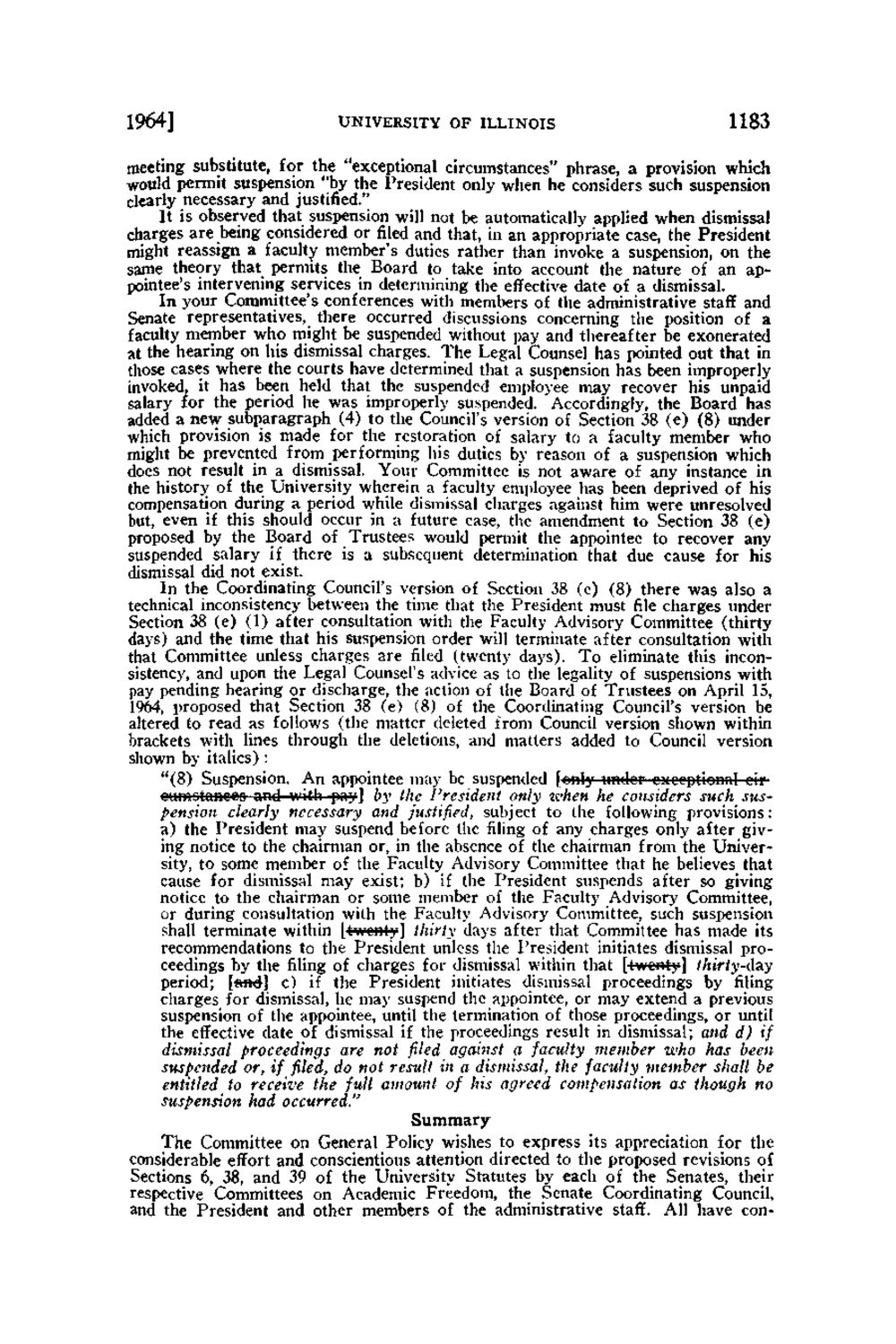| |
| |
Caption: Board of Trustees Minutes - 1964
This is a reduced-resolution page image for fast online browsing.

EXTRACTED TEXT FROM PAGE:
1964] UNIVERSITY OF ILLINOIS 1183 meeting substitute, for the "exceptional circumstances" phrase, a provision which would permit suspension "by the President only when he considers such suspension clearly necessary and justified." It is observed that suspension will not be automatically applied when dismissal charges are being considered or filed and that, in an appropriate case, the President might reassign a faculty member's duties rather than invoke a suspension, on the same theory that permits the Board to take into account the nature of an appointee's intervening services in determining the effective date of a dismissal. In your Committee's conferences with members of the administrative staff and Senate representatives, there occurred discussions concerning the position of a faculty member who might be suspended without pay and thereafter be exonerated at the hearing on his dismissal charges. The Legal Counsel has pointed out that in those cases where the courts have determined that a suspension has been improperly invoked, it has been held that the suspended employee may recover his unpaid salary for the period he was improperly suspended. Accordingly, the Board has added a new subparagraph (4) to the Council's version of Section 38 (e) (8) under which provision is made for the restoration of salary to a faculty member who might be prevented from performing his duties by reason of a suspension which does not result in a dismissal. Your Committee is not aware of any instance in the history of the University wherein a faculty employee has been deprived of his compensation during a period while dismissal charges against him were unresolved but, even if this should occur in a future case, the amendment to Section 38 (e) proposed by the Board of Trustees would permit the appointee to recover any suspended salary if there is a subsequent determination that due cause for his dismissal did not exist. In the Coordinating Council's version of Section 38 (e) (8) there was also a technical inconsistency between the time that the President must file charges under Section 38 (e) (1) after consultation with the Faculty Advisory Committee (thirty days) and the time that his suspension order will terminate after consultation with that Committee unless charges are filed (twenty days). T o eliminate this inconsistency, and upon the Legal Counsel's advice as to the legality of suspensions with pay pending hearing or discharge, the action of the Board of Trustees on April 15, 1964, proposed that Section 38 (e) (8) of the Coordinating Council's version be altered to read as follows (the matter deleted from Council version shown within brackets with lines through the deletions, and matters added to Council version shown by italics): "(8) Suspension. An appointee may be suspended [only under exceptional cir cumstanceo and with pevy] by the President only ivhen he considers such suspension clearly necessary and justified, subject to the following provisions: a) the President may suspend before the filing of any charges only after giving notice to the chairman or, in the absence of the chairman from the University, to some member of the Faculty Advisory Committee that he believes that cause for dismissal may exist; b) if the President suspends after so giving notice to the chairman or some member of the Faculty Advisory Committee, or during consultation with the Faculty Advisory Committee, such suspension shall terminate within [twenty] thirty days after that Committee has made its recommendations to the President unless the President initiates dismissal proceedings by the filing of charges for dismissal within that [twenty] thirty-day period; [«*4] c) if the President initiates dismissal proceedings by filing charges for dismissal, he may suspend the appointee, or may extend a previous suspension of the appointee, until the termination of those proceedings, or until the effective date of dismissal if the proceedings result in dismissal; and d) if dismissal proceedings are not filed against a faculty member who has been suspended or, if filed, do not result in a dismissal, the faculty member shall be entitled to receive the full amount of his agreed compensation as though no suspension had occurred." Summary The Committee on General Policy wishes to express its appreciation for the considerable effort and conscientious attention directed to the proposed revisions of Sections 6, 38, and 39 of the University Statutes by each of the Senates, their respective Committees on Academic Freedom, the Senate Coordinating Council, and the President and other members of the administrative staff. All have con-
| |